Metal drill bits are an essential tool in the world of metalworking. They are used to create holes in various types of metal, from soft aluminum to hard stainless steel. The importance of metal drill bits in metalworking cannot be overstated, as they are fundamental to the creation of many metal products and structures.
Understanding the intricacies of metal drill bits, including their types, materials, coatings, sizes, shapes, and angles, is crucial for anyone involved in metalworking. This knowledge can help in choosing the right drill bit for a particular task, ensuring precision and efficiency in the work.
The purpose of this article is to provide a comprehensive guide on metal drill bits, covering all aspects from their definition and role in metalworking to factors to consider when buying them, maintenance tips, safety precautions, and common mistakes to avoid.
Our Top Metal Drill Bit Picks
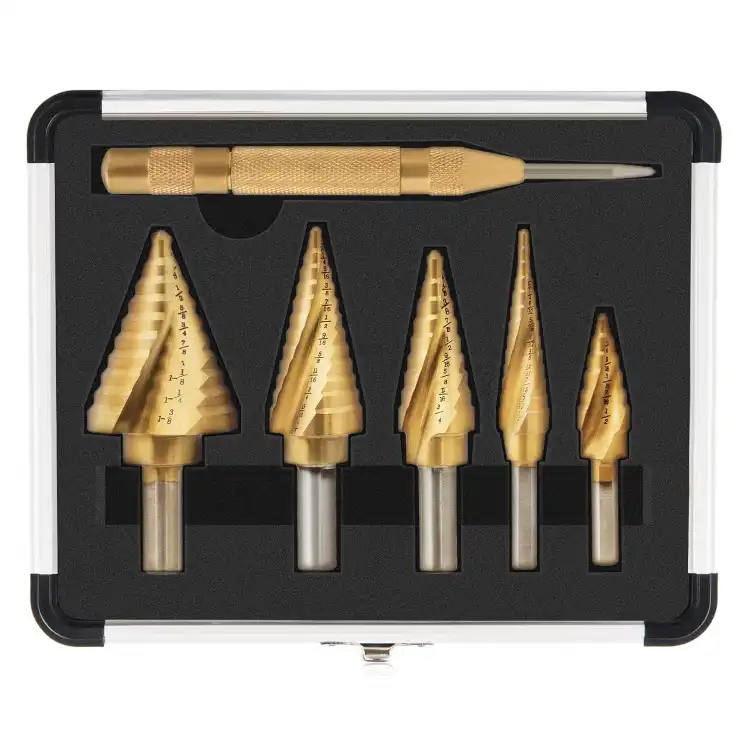
ZELCAN Step Drill Bits
Check on AmazonKey Specs
- Material: High-speed steel (HSS) with titanium coating
- Cutting Diameter: 0.88 inches
- Cutting Angle: 135-degree
- Shank Type: 3-flat
- Storage: Includes a holder with a size index
The ZELCAN Step Drill Bits are a game-changer for anyone who needs precision and versatility in their drilling tasks. The titanium coating ensures these high-speed steel (HSS) bits maintain sharpness, even under heavy use, allowing for cooler operation and increased wear resistance. With a 135-degree cutting angle, the split point tip minimizes friction for smoother, cleaner cuts. This set includes five commonly used sizes, making it ideal for metal, wood, and plastic. It also features a convenient storage solution to keep your workspace organized.
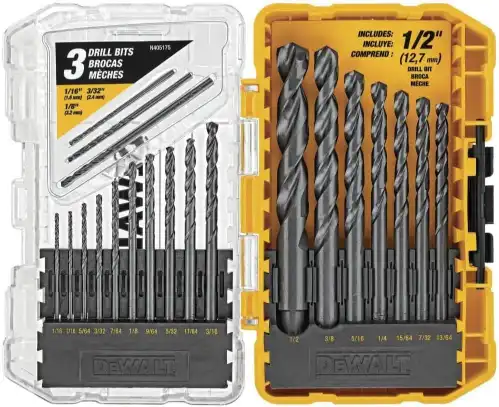
DEWALT Black Oxide Drill Bit Set
Check on AmazonKey Specs:
- Material: High-speed steel (HSS)
- Finish Type: Black oxide coating
- Cutting Angle: 135-degree split point
- Shank Type: 3-flats straight shank
- Size Markings: Clearly marked for quick identification
The DEWALT Black Oxide Drill Bit Set is engineered for durability and precision. Featuring a 135-degree split point tip, these drill bits reduce walking, making them ideal for wood, metal, and plastic. Crafted from High-Speed Steel (HSS), they offer exceptional strength, while the black oxide finish helps prevent rust and wear, extending the life of the bits. With a tapered web design for increased durability and size markings on the shank, these bits are perfect for both professionals and DIY enthusiasts.
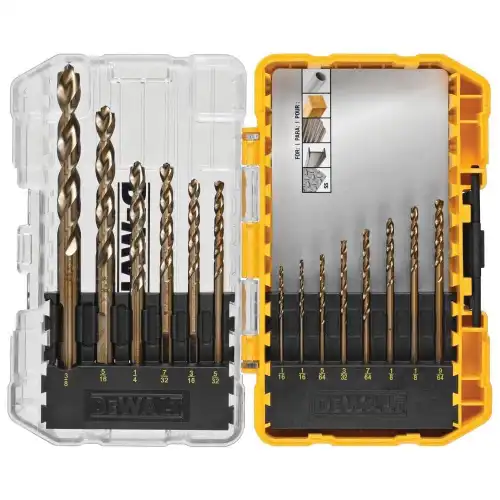
DEWALT Cobalt Alloy Steel Drill Bit Set
Check on AmazonKey Specs:
- Material: Cobalt alloy steel
- Finish Type: Cobalt alloy steel
- Cutting Angle: 135-degree split point
- Shank Type: Straight shank
- Storage System: Connectable ToughCase+ compatible, clip latch closure
The DEWALT Cobalt Alloy Steel Drill Bit Set is designed for tough materials like wood, metal, and even i-beams. Crafted from cobalt alloy steel, these bits offer exceptional durability and heat resistance. The set features a connectable accessory storage system, optimizing space, while the patented bit-bar design allows for easy removal and customizable placement of bits. The clear lid ensures quick visibility of contents, and the clip latch ensures secure closing for easy transport and storage.
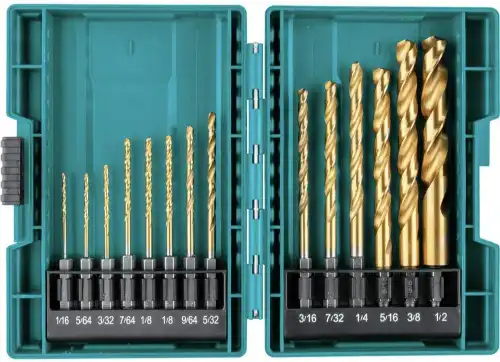
Makita B-65399 Impact Gold Drill Bit Set
Check on AmazonKey Specs:
- Material: Stainless steel
- Coating: Titanium Nitride (TiN)
- Cutting Diameter: 0.25 inches
- Shank Type: Hex
- Cutting Angle: 135-degree split point
The Makita B-65399 Impact Gold Drill Bit Set offers top-tier performance with its Titanium Nitride (TiN) coating, which extends the life of the bits 2.5x longer compared to non-coated alternatives. The 135-degree split point geometry ensures faster starts and reduces walking, making drilling more efficient. These bits are impact rated, perfect for use in 1/4-inch Hex impact drivers. They are versatile, designed for drilling in materials like ferrous metal, wood, plastic, non-ferrous metal, cast iron, and stainless steel.
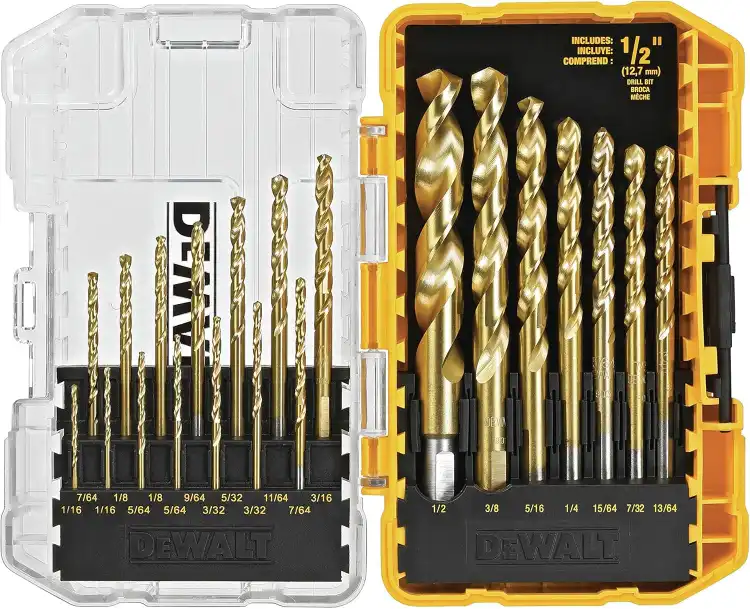
DEWALT Titanium Nitride Drill Bit Set
Check on AmazonKey Specs:
- Material: Titanium
- Cutting Diameter: 0.5 inches
- Coating: Titanium Nitride (TiN)
- Shank Type: Straight
- Speed Tip: Reduces walking for precision
The DEWALT Titanium Nitride Drill Bit Set features Titanium Nitride (TiN) coating, enhancing the durability of the bits for a longer life. The Speed Tip design helps reduce walking, ensuring precise starts, especially when drilling into metal, wood, and plastics. These bits come with a no-spin shank for secure chuck grip and are organized in a tough case container for easy storage and access. Ideal for various tasks, this set is built for longevity and performance.
Understanding Metal Drill Bits
A metal drill bit is a cutting tool used in drilling machines to create holes in metal. It is typically made of high-speed steel (HSS) or other hard materials and comes in various shapes and sizes to suit different applications.
The role of metal drill bits in metalworking is pivotal. They are used to cut through metal, creating holes for screws, bolts, or other fasteners. They can also be used to create decorative patterns or to remove excess material from a workpiece. Without metal drill bits, many metalworking tasks would be impossible to accomplish.
Understanding the properties and functions of metal drill bits is the first step towards mastering the art of metalworking. With the right knowledge, one can select the appropriate drill bit for a specific task, ensuring precision and efficiency in the work.
Types of Metal Drill Bits
There are various types of metal drill bits, each designed for a specific purpose. Some of the most common types include twist drill bits, step drill bits, and countersink drill bits. Twist drill bits are the most common type and are used for general drilling purposes. Step drill bits are used to drill holes of varying diameters, while countersink drill bits are used to create a conical hole for a countersunk screw.
Each type of metal drill bit has its unique uses and applications. For instance, a twist drill bit is ideal for drilling through thin metal, while a step drill bit is perfect for creating holes of different sizes in a single operation. On the other hand, a countersink drill bit is the go-to tool for creating a flush surface for a screw head.
Understanding the different types of metal drill bits and their uses can help in selecting the right tool for a specific task, leading to more efficient and precise metalworking.
Materials Used in Metal Drill Bits
The material used in manufacturing a drill bit greatly affects its performance. Common materials include high-speed steel (HSS), cobalt, and carbide. HSS is a popular choice due to its durability and ability to withstand high temperatures. Cobalt drill bits are known for their superior hardness and heat resistance, making them ideal for drilling through hard metals. Carbide drill bits, on the other hand, are extremely hard and can maintain a sharp cutting edge for a long time.
The choice of material can significantly impact the performance of the drill bit. For instance, while HSS drill bits are suitable for general-purpose drilling, cobalt drill bits are more suited for drilling through hard metals like stainless steel. Similarly, carbide drill bits are ideal for precision drilling as they can maintain a sharp cutting edge for a long time.
Therefore, understanding the properties of different materials used in metal drill bits can guide in selecting the right tool for a specific task, ensuring optimal performance and longevity.
Coatings and Their Importance
Coatings on drill bits serve several purposes. They can enhance the hardness of the drill bit, increase its lifespan, reduce friction during drilling, and prevent rust and corrosion. Some common types of coatings include black oxide, titanium nitride (TiN), and diamond powder.
Each type of coating has its unique benefits. For instance, black oxide coating improves heat resistance and extends the lifespan of the drill bit. Titanium nitride coating, on the other hand, increases the hardness of the drill bit, allowing it to maintain a sharp cutting edge for a longer time. Diamond powder coating, being the hardest material known to man, provides the ultimate in durability and wear resistance.
Understanding the different types of coatings and their benefits can help in choosing the right drill bit for a specific task, ensuring optimal performance and longevity.
Size and Length Considerations
Choosing the right size and length of a drill bit is crucial for precision metalworking. The size of the drill bit refers to its diameter, while the length refers to the total length of the bit from the tip to the end of the shank. The size and length of the drill bit should match the size and depth of the hole to be drilled.
The importance of size and length in precision metalworking cannot be overstated. A drill bit that is too small or too short may not be able to drill the required hole, while a drill bit that is too large or too long may cause damage to the workpiece or the drill bit itself.
Therefore, understanding how to choose the right size and length of a drill bit is essential for anyone involved in metalworking. It ensures precision and efficiency in the work, leading to high-quality results.
Drill Bit Shapes and Their Significance
Drill bits come in various shapes, each designed for a specific purpose. Some common shapes include twist, step, and countersink. Twist drill bits are the most common shape and are used for general drilling purposes. Step drill bits have a conical shape and are used to drill holes of varying diameters. Countersink drill bits have a conical tip and are used to create a conical hole for a countersunk screw.
The shape of a drill bit can significantly affect the drilling process. For instance, a twist drill bit is ideal for drilling through thin metal, while a step drill bit is perfect for creating holes of different sizes in a single operation. On the other hand, a countersink drill bit is the go-to tool for creating a flush surface for a screw head.
Understanding the different drill bit shapes and their effects on the drilling process can help in selecting the right tool for a specific task, leading to more efficient and precise metalworking.
Understanding Drill Bit Angles
The angle of a drill bit refers to the angle at which the cutting edges meet at the tip of the bit. Common drill bit angles include 118 degrees for general-purpose drilling and 135 degrees for drilling through hard materials.
The correct angle is crucial in precision drilling. A drill bit with a smaller angle is more aggressive and drills faster, but it may also wander or break more easily. On the other hand, a drill bit with a larger angle is more durable and drills more accurately, but it may also require more force to drill.
Therefore, understanding drill bit angles and their importance in precision drilling is essential for anyone involved in metalworking. It ensures accuracy and efficiency in the work, leading to high-quality results.
Factors to Consider When Buying Metal Drill Bits
When buying metal drill bits, several factors should be considered. These include durability, cost, material, size and shape, and coating. Durability refers to the lifespan of the drill bit, which is determined by the material and coating. Cost is another important factor, as high-quality drill bits can be expensive. The material of the drill bit determines its hardness and heat resistance, while the size and shape affect its suitability for a specific task. The coating can enhance the hardness of the drill bit, increase its lifespan, reduce friction during drilling, and prevent rust and corrosion.
Each of these factors plays a crucial role in determining the performance and longevity of the drill bit. For instance, a durable, high-quality drill bit may be more expensive, but it can also last longer and perform better. Similarly, a drill bit made of a hard material and coated with a hard coating can maintain a sharp cutting edge for a longer time, ensuring precision and efficiency in the work.
Therefore, understanding these factors and considering them when buying metal drill bits can help in choosing the right tool for a specific task, ensuring optimal performance and longevity.
Top Brands for Metal Drill Bits
There are many brands in the market that manufacture high-quality metal drill bits. Some of the top brands include Bosch, DeWalt, and Makita. Bosch is known for its durable and high-performing drill bits, while DeWalt is renowned for its innovative and user-friendly designs. Makita, on the other hand, is famous for its high-quality materials and precision engineering.
Each of these brands offers a wide range of products to suit different applications. For instance, Bosch offers a variety of drill bits for general-purpose drilling, while DeWalt offers specialized drill bits for drilling through hard metals. Similarly, Makita offers a wide range of sizes and shapes to suit different tasks.
Therefore, understanding the strengths and offerings of different brands can help in choosing the right drill bit for a specific task, ensuring optimal performance and longevity.
How to Maintain Metal Drill Bits
Maintaining metal drill bits is crucial for their performance and longevity. Some tips for cleaning and storing drill bits include cleaning them after each use, storing them in a dry and cool place, and sharpening them regularly. Cleaning the drill bits can prevent rust and corrosion, while storing them properly can prevent damage. Sharpening the drill bits can maintain their cutting edge, ensuring precision and efficiency in the work.
Proper maintenance can significantly prolong the life of your drill bits. For instance, a well-maintained drill bit can maintain a sharp cutting edge for a longer time, reducing the need for frequent replacements. Similarly, a properly stored drill bit is less likely to get damaged, ensuring its readiness for use at any time.
Therefore, understanding how to maintain metal drill bits is essential for anyone involved in metalworking. It ensures the performance and longevity of the tools, leading to cost savings and high-quality results.
Safety Tips When Using Metal Drill Bits
Safety is paramount when using metal drill bits. Some basic safety precautions include wearing protective gear, using the right drill bit for the task, and operating the drill machine properly. Protective gear, such as safety glasses and gloves, can protect against flying debris and accidental cuts. Using the right drill bit can prevent damage to the workpiece or the drill bit itself. Operating the drill machine properly can prevent accidents and ensure efficient and precise drilling.
In case of an accident, it is important to know what to do. Some basic first aid measures include cleaning the wound, applying a bandage, and seeking medical attention if necessary. It is also important to know how to operate the emergency stop button on the drill machine, as it can stop the machine immediately in case of an emergency.
Therefore, understanding the safety precautions when using metal drill bits is essential for anyone involved in metalworking. It ensures the safety of the user and the efficiency of the work, leading to high-quality results.
Case Study: Successful Use of Metal Drill Bits in a Project
A recent project involved the construction of a metal sculpture. The right drill bit was crucial to the success of the project, as it allowed for precise drilling of holes in the metal pieces, ensuring a perfect fit and a sturdy structure.
The project involved drilling holes in various types of metal, including aluminum, steel, and brass. A variety of drill bits were used, including twist drill bits for general drilling, step drill bits for drilling holes of varying diameters, and countersink drill bits for creating a flush surface for the screws.
The successful completion of the project demonstrated the importance of choosing the right drill bit for a specific task. It ensured precision and efficiency in the work, leading to a high-quality and durable metal sculpture.
Common Mistakes to Avoid When Buying and Using Drill Bits
There are several common mistakes to avoid when buying and using drill bits. These include buying cheap drill bits, using the wrong drill bit for the task, and neglecting maintenance. Cheap drill bits may not be durable or high-performing, leading to poor results and frequent replacements. Using the wrong drill bit can cause damage to the workpiece or the drill bit itself. Neglecting maintenance can reduce the lifespan and performance of the drill bit.
Each of these mistakes can be costly, both in terms of money and time. For instance, buying cheap drill bits may seem like a good deal initially, but it can lead to frequent replacements and poor results, costing more in the long run. Similarly, using the wrong drill bit can cause damage to the workpiece, leading to wasted materials and time.
Therefore, understanding these common mistakes and how to avoid them can help in choosing and using metal drill bits effectively, ensuring optimal performance and longevity.
Conclusion
Metal drill bits are an essential tool in the world of metalworking. Understanding their intricacies, including their types, materials, coatings, sizes, shapes, and angles, is crucial for anyone involved in metalworking. This knowledge can help in choosing the right drill bit for a specific task, ensuring precision and efficiency in the work.
When buying metal drill bits, several factors should be considered, including durability, cost, material, size and shape, and coating. Proper maintenance and safety precautions are also crucial for the performance and longevity of the drill bits, as well as the safety of the user.
In conclusion, choosing the right metal drill bit for precision metalworking is not a trivial task. It requires a deep understanding of the properties and functions of metal drill bits, as well as careful consideration of various factors. However, with the right knowledge and approach, one can master the art of metalworking, leading to high-quality results and a rewarding experience.
FAQ
What is a metal drill bit?
A metal drill bit is a cutting tool used in drilling machines to create holes in metal. It is typically made of high-speed steel (HSS) or other hard materials and comes in various shapes and sizes to suit different applications.
What are the different types of metal drill bits?
Some of the most common types of metal drill bits include twist drill bits, step drill bits, and countersink drill bits. Each type has its unique uses and applications.
How do I choose the right size and length of a drill bit?
The size and length of the drill bit should match the size and depth of the hole to be drilled. A drill bit that is too small or too short may not be able to drill the required hole, while a drill bit that is too large or too long may cause damage to the workpiece or the drill bit itself.
